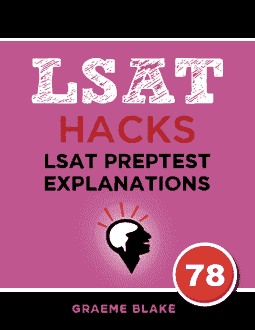QUESTION TEXT: Ethicist: The general principle-if one ought to do…
QUESTION TYPE: Necessary Assumption
CONCLUSION: It is false to say “If you should do something, then you can do that thing.”
REASONING: We can imagine situations where someone promises to do something, but then is unable to do it.
ANALYSIS: This is a confusing argument. The ethicist is arguing against the idea cited in the conclusion. Their reasoning is that you might be unable to do something you’ve promised to do.
The argument makes one valid unstated assumption: that making a promise creates an obligation. This is pretty much the definition of “promise”.
So the author is arguing: We have an obligation created by a promise. The promise can’t be fulfilled. But, the obligation remains. So, we are obliged to do something we cannot do.
It’s fancy wordplay, even by LSAT standards. A promise creates an obligation, but the author is still considering the promise and the obligation to be two separate things. (Which is a valid distinction, but subtle.)
___________
- There are two things wrong with this answer:
1. It’s backwards. “failed promise
➞ failed obligation” would support the ethicist, but this answer says “failed obligation ➞ failed promise”
2. Even if it was in the right order, this answer would be a sufficient assumption. - This is silly. The ethicist was arguing that an event like a traffic jam would be an excuse. They weren’t arguing that such an event was the only possible excuse.
Negation: Many events could excuse a person from an obligation. - The ethicist was arguing against this idea: “If yo ought to do something, you can”. This answer is just the incorrect negation of that principle. It’s a common LSAT trap: introducing relevant sounding words, with an entirely different logical meaning. This answer has no logical relation to the argument. And so the negation has no effect.
I gave an example of the negation to clarify how irrelevant this answer is: the existence of heroin addicts in no way attacks the ethicist’s argument.
Negation: A person might be incapable of not doing something they ought not to do.
Example of negation: A heroin addict does heroin, even though they shouldn’t. They couldn’t help doing it. i.e. they can’t avoid doing what they shouldn’t do. - CORRECT. If this is negated, then the argument falls apart. We are in a situation where we can’t do the thing promised, but yet we also have no obligation.
The argument requires a situation where there is an obligation.
Negation: If a promise can’t be kept, then there is no more obligation to keep it. - This is a “should” statement. The argument was making a factual claim: whether or not there exist situations where we are unable to do a thing we were supposed to do.
The LSAT makes a strict separation between “should” and “fact”. So this answer cannot be right.


Just one clarification on (C), because the reason why it is wrong is a bit tricky:
Actually the problem is not really being the “converse” or “incorrect negation” of the principle stated. For example, “you ought not eat ice cream” can easily be translated into “you ought to avoid eating ice cream”, means I am still in the field of “ought to do something”.
This answer choice not only is not a necessary assumption, but it actually weakens the argument. If we replace “not do” with “do” (which we are allowed to do, as explained above, it doesn’t change the effect of the principle), it says: if one ought to do something, then it is something thant the person is capable of doing. But this is EXACTLY the general principle the ethicist tries to explain that it does not hold always true! ;)
I don’t agree on this point. Ought to avoid is still something you ought not do. There is a meaningful difference between “you ought to say thank you” and “you ought not set things on fire”.
You can fulfill the second obligation merely by sitting motionless on the couch, but to thank people you have to affirmatively do something.
However, writing this out, I think you’re correct that C isn’t an incorrect negation either. It’s more like an incorrect flip, from affirmative duty to instead a duty not to, and from positive capability to ability to resist. It’s similar in principle to an incorrect negation, but different mechanically.
I’m going to put this in the list of explanations to revise, as I think I can make better reasoning against C. Thanks.
Note: This is an old comment but I wanted to clarify the point.
Hey Graeme! For answer choice, C, isn’t it really just saying the same thing as the general principle; O -> C? Being that the “not” comes after the “ought” and after the “capable?” They OUGHT to not do something (so technically, it’s still something they OUGHT to do)?
I think there’s a meaningful difference between doing something and avoiding something. That said I’m flagging C for review as I think I can do a better job on it.
Note: This is an old comment but I wanted to clarify the point.